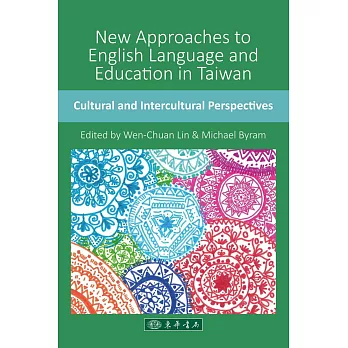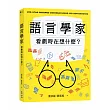Of the following twelve chapters, eight are based on doctoral dissertations, supervised by Professor Michael Byram at Durham University in England, and the other four are invited chapters by scholars from Wenzao Ursuline University of Languages in Taiwan, who also base their contributions on their doctoral research. The editors hope to show in this way the relevance of doctoral research and the importance of making it widely known.
The book is divided into four parts. In the first part there are two chapters which contextualize language teaching by historical analysis of the significance of languages in Taiwan. In Chapter 1, (Towards an intercultural citizenship community: monoculturalism or interculturalism?), Mei-Lan Huang presents a historical analysis of the evolution of language education and monoculturalism in Taiwan after 1945. Her chapter analyzes the relationship between the ideology of Chinese monoculturalism and its language education on the one hand, and on the other hand the development of imagined Taiwanese monoculturalism and its efforts in building the concept of a Taiwanese nation through reviving Taiwanese local native languages in present and future language education. It is based on document analysis and interviews with key figures in Taiwan recalling their childhood experience of education.
In Chapter 2, (Identity, education, and language: a case study in Taiwan), Grace Lee analyzes how language attitudes in Taiwan play out in people’s lives, some traces of which are also present in Chapter 1. Here, however, the objective was to look, in a detailed and chronological analysis, at the life history of one Taiwanese woman who lived through three educational systems in Taiwan. Her life story, collected through multiple interviews, is examined for moments and experiences which depict her views on her identity, and analyzed with particular attention to the relationship between identity, language and education.
The second group of chapters brings the focus onto the experiences of learners in the education system today at the crucial moments of transition from one level to the next. In Chapter 3, (Challenging the pedagogical discontinuity in EFL between elementary and junior high schools in Taiwan), Wen-Chuan Lin addresses the need to solve problems of elementary-junior high school transition and ensure continuity in pedagogical practice between the two social settings. His study explores differences in students’ access to EFL learning in four Taiwanese junior high schools and challenges the myth of “the earlier the better in learning foreign languages” when there is no consideration of issues of transition between elementary and junior high. Implications pertaining to elementary-junior high progression in pedagogical practice are discussed which may inform practitioners and policy makers who are concerned with the gap in EFL learning and teaching.
In Chapter 4, (Cultures of learning in English language classrooms in Taiwan during the transition year from elementary to junior high school), Chin-Pin Chen develops further the issue of elementary-junior high school transition with an analysis of discursive patterns which influence and inform the transitional year. This chapter addresses the question of “whole-class teaching, individual testing” and its implications for the transitional process. Despite the apparent similarities in terms of teachers’ design of whole-class teaching activities and conducting of individual tests before and after transition, the meanings of tests are probably different, indicating possible discontinuity of cultures of learning between the two educational phases. Since teachers from both educational phases hardly have opportunity to meet each other, a certain degree of mistrust can arise, and none of this is to the benefit of students moving from one educational phase to the other.
The next group of chapters concentrates even more on learners and learning processes. In Chapter 5, (EFL learners developing critical intercultural awareness through process drama), Wen-ling Irene Chen challenges the role of foreign languages teaching and learning in the reproductive purpose of education systems. Her study addresses the significance and urgency of developing “critical intercultural awareness” (CIA) in Taiwan students’ language learning experience, by describing an action research project that explores how and why CIA can be developed in process drama praxis in the context of Advanced English Learners’ Programs for junior high school students in Taiwan.
In Chapter 6, (A cooperative task-based learning approach to motivating low achieving readers of English in a Taiwanese university), Tsu-Chia Julia Hsu analyzes the problem of some first-year university students in Taiwan who had low English scores in their university entrance examinations, and who did not necessarily perform at their full potential in English language. Her study seeks an effective approach to the teaching of reading, one that will help these students to enhance their confidence and motivation. The approach includes cooperative learning and Task-Based Language Teaching, which encourages frequent interactions and positive involvements that are crucial for reinforcing motivation. A new pedagogy integrating these two methods was thus developed and applied.
In Chapter 7, (A study of translation teaching in a university of science and technology in Taiwan), Hsiu-Tzu Charlene Shen argues that translation studies is seen as a significant facilitator in the nation’s competitiveness in a globalized economy, and has developed as a discipline in the past two decades to answer the call from government for a response to globalization. Given the limited literature about Translation Studies curriculum development in Taiwan and taking into account the students’ interests in a technological university context, her study investigates whether students will learn effectively or perform better when taught with a curriculum which is derived from their needs.
Finally, in this section, Chapter 8, (Promoting the cultural dimension in EFL teaching: a turning point for English education in Taiwan), Yau Tsai argues that the promotion of the cultural dimension in EFL teaching is the key factor which can help students to develop the intercultural communicative competence needed in a global society. Her study explains the characteristics of intercultural communicative competence and the reasons why promoting the cultural dimension in EFL teaching leads to the development of this competence. Through the analysis of group interviews with students, relevant problems impeding the promotion of the cultural dimension in EFL teaching are identified and then suggestions are made for both the Ministry of Education and English teachers in Taiwan.
In the fourth and final group of chapters the focus is on teachers, on their classroom activities and on their professional development. In Chapter 9, (Analyzing EFL team-teaching in Taiwanese elementary English education: an intercultural perspective), Shu-Hsin Chen analyzes “team teaching”, a phenomenon often seen in elementary and/or secondary EFL classrooms in some East Asian countries, including Taiwan, where the fact that cultural differences between local teachers and foreign teachers affect team teaching effectiveness, is receiving increasing attention. Aiming at understanding how teachers of EFL conceptualize their team teaching experience, this ethnographic study elicited interview data from local and foreign teachers of EFL in Taiwan. The intercultural team teaching capacity (ITTC) model provides a useful source for future research and training programme development in the areas of TESOL, ELT, intercultural education, intercultural communication, and multicultural team management.
In Chapter 10, (The journey of sixty adventurers to becoming English language teachers in Taiwan) Wei-Yan Miguel Li evaluates the success of ELT initial teacher education in Taiwan. The effectiveness and practicality of the training contents and the outcomes of different training programmes are investigated. One central concept needs clarifying: what is expected in an able ELT? It is only with a clear idea of an answer to this question that the evaluation of training programs is possible, to establish if they are providing training in accordance with what the trainees need for their future teaching profession. A framework of required professional competencies (FRPC) is developed which characterizes a competent language teacher and is a basis for evaluation of courses.
In Chapter 11, (An online teacher professional development framework for Taiwanese English teachers in supplementary schools: undoing self-marginalization), Pai-Hsien Aiden Yeh argues that Taiwanese English teachers in supplementary schools are often marginalized. This is partially caused by widespread discrimination in Taiwan where people hold a strong misconception that only those with native-speaker-like features can be considered as “true native English speaker teachers”. Her study shows that to become an effective EFL teacher, one must be motivated to gain improvements in professional skills, stay committed to the profession, and keep the passion for teaching and learning burning. Perhaps more importantly, it shows that engaging in continuous teacher professional development can be a form of self-empowerment; improving themselves professionally can boost teachers’ sense of identity as language teachers.
In Chapter 12, (Towards a global citizenship: the intercultural competence development of Taiwanese university teachers through short-term study abroad), I-Jane Janet Weng is concerned with the promotion of intercultural citizenship which favors multiculturalism and equality in preparing students in a global community. Her study seeks to expand the focus of research to report the learning experience of seven Taiwanese university teachers who participated in a short-term overseas tour. She found that an authentic and rich intercultural short study abroad program can serve as an effective way in fostering the intercultural competence of university teachers. The intercultural experience helps them transform personally and professionally to teach with new approaches to promote intercultural citizenship.
Wen-Chuan Lin and Michael Byram
In an age of globalization, English as a foreign language (EFL) is generally assumed to be the pivotal element in global communication. Crystal (2003) described English as a “global language”, given its geographical-historical and socio-cultural influences, and people in Taiwan tend to assume that anything involving English must be good. In Taiwan, learning English as an international language has become vital to its economy in terms of providing access to the world community, and is viewed as one of the keys to success in Taiwan’s economic globalization and modernization. Being able to speak English carries considerable prestige and it is generally believed that speaking better English fuels upward mobility in terms of occupation and social status. However, official views of economic and international exigency tend to see the overall decline in the national examination results for EFL learning as disappointing (e.g., Chang, 2006) and this gives rise to a growing public concern about young people’s capacity for communicating across the world in English.
The authors of this book are EFL teachers and researchers who have years of EFL teaching experiences at various educational levels in Taiwan. They have searched for practical examples of innovation or illustrations of empirical findings from their research work -predominantly from their doctoral studies -dealing with either their analyses of EFL teaching on a mundane daily basis or their understanding of the contemporary EFL context and its historical origins. The nature of the book therefore is a reflection and reconceptualization of EFL teachers’ and researchers’ practice through scientific inquiry. The purpose is to provide new insights such as cultural and intercultural approaches to English teaching and learning.
This book is written however not only for Taiwanese readers but also for readers in other Asian regions such as China, Hong Kong, Singapore, Japan and Korea who are concerned with EFL language and education as much as professionals in Taiwan. For the editors and contributors are convinced that the issues raised are common throughout East Asia and that a cooperative approach to analysis and resolution is the best way forward.



 天天爆殺
天天爆殺  今日66折
今日66折 





















![威廉.肯特里奇[精裝]](https://im1.book.com.tw/image/getImage?i=https://www.books.com.tw/img/001/098/79/0010987920.jpg&v=66263c53k&w=110&h=110)

 博客來
博客來 博客來
博客來 博客來
博客來 博客來
博客來 博客來
博客來